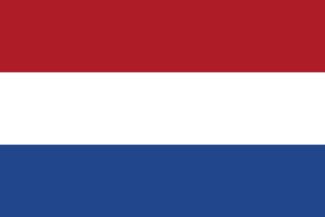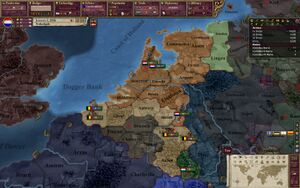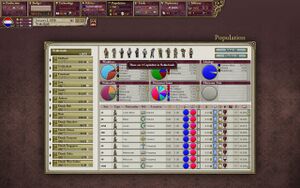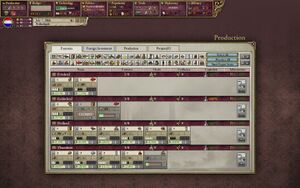无编辑摘要 |
|||
| 第38行: | 第38行: | ||
[[File:1836NetherlandsPOP.jpg|thumb|left|300px|The Dutch demographics as of January 1st 1836.]] | [[File:1836NetherlandsPOP.jpg|thumb|left|300px|The Dutch demographics as of January 1st 1836.]] | ||
当荷兰开始宣战时,我们必须意识到,英国将会介入,因为它认为比利时是其势力范围的一部分。在1836年1月的头几天,[[ 普鲁士]] 很可能会向荷兰政府提出一个联盟要求,为了抵御英国和/ 或法国的干预,最好是接受它。也有可能在最初几个月内,同时寻求与英国和/ 或法国结盟,但荷兰与这两个国家的关系相对较差。 | |||
其他联盟可以很容易地与{ flag | 奥地利 } 或{ flag | 丹麦 } 发生冲突,但在任何情况下,玩家必须在向比利时宣战之前结盟。在整个冲突过程中,荷兰政府需要借入大量的资金,以便为军队提供足够的补给,一旦冲突结束,玩家将能够处理债务偿还。尽管如此,我们还是必须关注贷款利息,这样它们就不会超过政府的总体预算,从而迫使荷兰政府违约。此外,一旦比利时工业( 再次) 超越尼德兰王国,瓦隆和佛兰德资本家将迅速开始在荷兰、盖尔德兰和弗里斯兰建立工厂。 | |||
比利时军队足够强大,可以与尼德兰军队抗衡,所以调动尼德兰后备人力对于玩家来说是不可或缺的。 | |||
最好的策略是等待比利时军队进攻。几个月后,英军很有可能在荷兰、西兰或布鲁日登陆,因此在这些沿海省份驻扎军队是不可取的,尽管占领布鲁日应该是玩家的首要考虑之一。当英国人试图海上入侵时,普鲁士军队很可能会把他们赶回大海。随着比利时的占领结束,兼并他们将成为可能,但与英国的战争很可能会拖延几个月,甚至几年。 | |||
Waging naval war on the British navy will only lead to annihilation of the Dutch squadrons, so it is best to leave them in port. Most likely, British forces will land and occupy some of the lesser Dutch colonies : Suriname in South America, the Western half of New Guinea, Bali, Sulawesi, or even Sumatra. Recruiting Indonesian troops in provinces where manpower allows it might also help Dutch colonials in defeating any tentative British invasion in Indonesia. Down the line, Prussia might be able to secure a White peace with the United Kingdom or, if the Dutch State need to pacify London in a quicker fashion, it may offer cession of Dutch Guyana (Suriname) or any other inconsequential colony in Africa, for example. | Waging naval war on the British navy will only lead to annihilation of the Dutch squadrons, so it is best to leave them in port. Most likely, British forces will land and occupy some of the lesser Dutch colonies : Suriname in South America, the Western half of New Guinea, Bali, Sulawesi, or even Sumatra. Recruiting Indonesian troops in provinces where manpower allows it might also help Dutch colonials in defeating any tentative British invasion in Indonesia. Down the line, Prussia might be able to secure a White peace with the United Kingdom or, if the Dutch State need to pacify London in a quicker fashion, it may offer cession of Dutch Guyana (Suriname) or any other inconsequential colony in Africa, for example. | ||
2021年3月20日 (六) 10:29的版本
| 尼德兰 | |
|---|---|
 | |
| 政府类型 | 绝对君主制 |
| 执政党 | 保守主义 |
| 首都 | 阿姆斯特丹 (ID 375) |
| 人口 | 4.08 Million |
| 主体民族 | 荷兰人 |
| 被接受民族 | 佛兰德人 |
| 识字率 | 58.9% |
| 国家价值观 | 秩序 |
| 科研学派 | 传统学术界 |
| 地位 | 次强 |

自近代早期以来,“尼德兰”一直通过控制海外贸易来谋求国内繁荣。他们精明的的商人和造船者推动了与商业有关的不同领域的创新: 金融、信贷和殖民。这种策略导致他们建立了伟大的特许公司,努力在美国非洲和亚洲建立殖民地。拿破仑战争之后,尼德兰政府完全控制了曾经属于 voc (荷属东印度公司)和 gwic (荷属西印度公司)的殖民地。
在1815年的维也纳会议上,前奥属尼德兰(现在或多或少构成了{ flag | 比利时 })被并入尼德兰北部的七个省份,组成了新成立的尼德兰王国。但是到了1830年,北部新教省份和南部天主教省份之间的紧张局势达到了如此程度,以至于内战导致佛兰芒省和瓦隆省脱离,并使{ flag | 英国 }和{ flag | 法兰西 }承认新成立的比利时王国。 尼德兰直到1839年的伦敦条约,才正式承认比利时的独立,所有大国都在条约中保证了他们的独立。1914年德国入侵比利时,无视普鲁士签署的”一纸空文”是英国卷入第一次世界大战的主要原因。
初始位置
在欧洲, 尼德兰的领土与它的近邻相比无疑是小巫见大巫: { flag | 法兰西 } ,{ flag | 普鲁士 }} ,和[英国]。在欧洲之外,荷兰的殖民地相当广阔: 加勒比地区的三个岛屿(库拉索、阿鲁巴岛和荷属西印度群岛的圣马丁) ,苏里南的两个省(圭亚那) ,以及[[非洲]的几个较小的沿海殖民地。其殖民帝国的大部分位于印度尼西亚,荷兰人控制着苏门答腊岛、苏拉威西岛、摩鹿加群岛、婆罗洲的南部和新几内亚的西半部以及一些小岛,除了自己的土地,它还是{ flag | 卢森堡 }的领主。 事实上,荷兰最初的位置,在历史上是相当不准确的,因为荷兰在1836年,只控制了苏门答腊岛,爪哇岛和苏拉威西岛的海岸。这些领土的大部分在1860年以前都不是殖民地。
尼德兰的主要文化是尼德兰文化,但是佛兰德斯文化是被接受的。爪哇文化和摩鹿加文化融入了荷兰王国的人口结构,尽管它们代表了荷兰印尼众多的殖民人口,而这些人口并没有考虑到国内政治。整个1836年,荷兰的国际地位,作为一个[次强]应该在的第8名和第11名之间波动。
经济
与[英国] ,[法国] ,或者尼德兰南部(1836年,[比利时])不同 ,尼德兰北部并没有早早开始工业化。经济是以农民、劳动者的产出以及更多的剥削为基础的,以及对亚洲更具异国情调和利润丰厚的资源的开发。预算是稳定的,如果需要的话,政府可以通过向荷兰国家银行(dutch national bank)借款来支持其第一批政策。因此,尼德兰不会从一群狂热的资本家开始,他们可能会掀起经济现代化所需的工业革命。要做到这一点,尼德兰政府将需要依靠(国家焦点)来培养最初几个本土的尼德兰资本家。
尼德兰经济增长面临的另一个挑战是,即使在尼德兰本土,识字率也相对较低。这种特性破坏了荷兰的技术研究,必须在最初几年内予以纠正,以便这个国家不落后于其强大的邻国。
决议与任务
唯一可供玩家使用的尼德兰独特的[决议]是签署[[伦敦条约] ,放弃尼德兰在比利时的领土,以换取威望和与8个[列强]和比利时的[关系]。
发展战略
从1836年1月1日起,尼德兰王国有了两条主要发展道路: 重新合并[比利时] ,或者继续前进,在其他地方弥补损失,尽管这两种策略并不互相排斥。玩家可能希望避免签署伦敦条约(以免失去比利时的核心) ,但要打消任何迅速重新征服尼德兰南部的想法,以编织一个外交网络,使英国或法国干预的可能性降低。
策略 A (吞并比利时)
当荷兰开始宣战时,我们必须意识到,英国将会介入,因为它认为比利时是其势力范围的一部分。在1836年1月的头几天,普鲁士很可能会向荷兰政府提出一个联盟要求,为了抵御英国和/或法国的干预,最好是接受它。也有可能在最初几个月内,同时寻求与英国和/或法国结盟,但荷兰与这两个国家的关系相对较差。
其他联盟可以很容易地与{ flag | 奥地利 }或{ flag | 丹麦 }发生冲突,但在任何情况下,玩家必须在向比利时宣战之前结盟。在整个冲突过程中,荷兰政府需要借入大量的资金,以便为军队提供足够的补给,一旦冲突结束,玩家将能够处理债务偿还。尽管如此,我们还是必须关注贷款利息,这样它们就不会超过政府的总体预算,从而迫使荷兰政府违约。此外,一旦比利时工业(再次)超越尼德兰王国,瓦隆和佛兰德资本家将迅速开始在荷兰、盖尔德兰和弗里斯兰建立工厂。
比利时军队足够强大,可以与尼德兰军队抗衡,所以调动尼德兰后备人力对于玩家来说是不可或缺的。
最好的策略是等待比利时军队进攻。几个月后,英军很有可能在荷兰、西兰或布鲁日登陆,因此在这些沿海省份驻扎军队是不可取的,尽管占领布鲁日应该是玩家的首要考虑之一。当英国人试图海上入侵时,普鲁士军队很可能会把他们赶回大海。随着比利时的占领结束,兼并他们将成为可能,但与英国的战争很可能会拖延几个月,甚至几年。 Waging naval war on the British navy will only lead to annihilation of the Dutch squadrons, so it is best to leave them in port. Most likely, British forces will land and occupy some of the lesser Dutch colonies : Suriname in South America, the Western half of New Guinea, Bali, Sulawesi, or even Sumatra. Recruiting Indonesian troops in provinces where manpower allows it might also help Dutch colonials in defeating any tentative British invasion in Indonesia. Down the line, Prussia might be able to secure a White peace with the United Kingdom or, if the Dutch State need to pacify London in a quicker fashion, it may offer cession of Dutch Guyana (Suriname) or any other inconsequential colony in Africa, for example.
Once order is restored in Belgium and peace has been reached with the United Kingdom, the Dutch government has to be wary of a French declaration of war. Paris will most likely seek to add Wallonia and/or Flanders to its territory (or force the Dutch State to release Belgium/Wallonia/Flanders) if the Franco-Dutch relationships are not warming up by then. Keeping up with the Prussian alliance might well be the solution to avoid losing back the southern provinces. On the other hand, a unified Germany could prove to be an even bigger threat than France so the Netherlands might want to play both alliances to maintain a continental equilibrium in Europe.
Strategy B (Ratifying the Treaty of London)
War at home might be too much for some players that want to follow a less risky and more historical path. In this case, up-starting the Dutch industrial revolution is the first challenge of the Dutch government. The Conservatives in power (Conservatieven) allow the player to assist in funding industrial projects crafted by the capitalists.
In order to have some of these projects off the ground, though, the Netherlands must use their National focus to promote a homegrown class of capitalists. The Holland Region or State, by being the most densely populated area of the Netherlands is a prime contender to be the target for such social experiments. Once construction of the first factory is underway, the National focus must be switched to encourage Holland's farmers and labourers to convert into craftsmen (and later on, clerks). In turn, these capitalist from Holland, Zeeland and Utrecht will fund the construction of railways across the country, and set up industries in Gelderland or Friesland.
Moreover, one of the urgent challenges that the Dutch government must tackle is the low literacy of its population compared with France, Scandinavian nations, or especially German minors (this is especially true if Belgium was brought back into the fold as both Flemish and Wallonian populations suffer from anemic levels of literacy). In order to put Dutch research on the fast track, the government will need to promote education by funding it properly (over 90% on the Budget screen), promote clergymen with the use of the National focus, and target specific cultural technologies like Idealism or Positivism. Once each European Dutch regions sports more than 2% clergymen, the National focus can be put to other uses.
Indonesia's RGOs will come off as very profitable early on. One might at to those, by taking ![]() Johore with (precious metals) and colonizing Alor (tropical wood). Starting in the 1870s-1880s, some of the Indonesian provinces RGOs will switch to produce oil which won't be of much use before it can be converted into fuel and then bought for civilian and military motorized vehicles. In any case, the Netherlands are poised to become in the late 19th Century, a top producer of many novel industrial and consumers goods.
Johore with (precious metals) and colonizing Alor (tropical wood). Starting in the 1870s-1880s, some of the Indonesian provinces RGOs will switch to produce oil which won't be of much use before it can be converted into fuel and then bought for civilian and military motorized vehicles. In any case, the Netherlands are poised to become in the late 19th Century, a top producer of many novel industrial and consumers goods.
It is important to subsidize the continued existence of the first few Dutch industrial productions whilst researching industrial and commercial technologies to improve the efficiency of their production to keep the Dutch industrial complex within the top 8 industrial nations because prestige or military might be harder to get by. To this end, Conservatives need to be kept in place at least long enough until workers can switch easily between factories if one's production takes a temporary turn for the worse and avoid mass unemployment that, in turn, targets immigration out of the country. The Liberal parties (Liberale Partij, but also the Rooms-Katholieke Partij if you have annexed Flanders) and Anarcho Liberals will not tolerate the government mingling in the economy and subsidizing or funding industrial activities directly will not be possible. On the contrary, to remain solvent, the Dutch government must make sure that subsidies are employed only as a temporary measure and are not putting the State's finances in shambles for too long (more than 12–24 months).
Strategy C (Remove the british influence in Belgium before the attack)
If one wants to annex Belgium, but sees the British's armies as a too big challenge, one can try to raise to Great power and raise to friendly status in Belgium, without signing the treaty. This way one can remove Great Britain as sphere leader and then attack Belgium. Belgiums armies alone is quite easy to defeat without British intervention. If one is lucky, Belgium will raise to Great power itself or fall to a revolution, which will result in that the British influence is lost and Belgium will be open for an assault. Be wary that even after UK has lost influence in Belgium they can still share an ordinary alliance.
Strategy D (Annexing a part of Belgium and ratifying the Treaty of London)
Annexing Belgium will certainly guarantee the Netherlands to become a great power; however, many other great powers such as France and Britain will likely to be hostile toward Netherlands. Ratifying the Treaty of London will surely demote the Netherlands from being a great power statues and get influenced by the other great powers. Thus, it is a common dilemma for neophyte and many players. Yet, there is a secure way for the Netherlands to become a great power and maintain good relationships with other powerful nations: Annexing a part of Belgium and ratifying the treaty of London.
Annexing a part of Belgium: Right from the start, it is crucial for the Netherland to ally with Prussia. Then, wait until France declares war on Britain and wipes out the Belgium army or just declare war on Belgium with Prussia by using the restore order casus belli(Do not use any other casus bellis). After short and intense battles with Belgium, it will eventually surrender itself toward Netherlands. Accept Belgium’s surrender, wait for few months, and give up a part of Belgium (whether Wallonie or Flanders) toward Britain. By giving up just one Belgium territory toward Britain, the Netherlands will be able to end the war quickly with Great Britain and retain or maintain the great power statues.
Ratifying the treaty of London: After the Netherlands has gained a part of Belgium, it is time to promote neutrality and harmony with other great nations. Quickly restore relationships with Great Britain and sign the treaty of London. By accepting the treaty, the Netherlands will be able to maintain good relationships with neighboring great nations
So, what happens next?
The Netherlands must seek to expand her colonies in Asia and Africa, in order to maintain its status as a powerful nation. Demand concessions from Morocco and other African countries and later, annex as many African countries as possible. Establish protectorates in Asia by invading ![]() Atjeh, Dai Nam,
Atjeh, Dai Nam, ![]() Siam,
Siam, ![]() Brunei, and other southeast Asian countries.
Brunei, and other southeast Asian countries.
During the expansion process, many neighboring countries will often request military access. It is crucial for the Netherlands to accept every military access request as they increase relationships with other countries. In this way, great powers like Austria and France will be likely to offer alliances.
Don’t be reluctant to rely on your allies, because the Netherlands(even if all of Belgium is annexed) is a small country. Even if the Netherlands manages to colonize the majority of Africa, it will still require much assistance from other nations. A possible next step is annihilating Russia with France and Austria, as they are powerful allies. An alliance with Sweden could help start a war with Russia, as Russia declares war on Sweden regularly. Because defeating Russia will prove difficult, the Netherlands should call Austria and France into the war. As result, the Netherlands would have two strong allies, Austria and France, against Russia.
Colonization of Africa
The Netherlands starts with a big deficit of colonial points, meaning that it must either expand its coastal Regions in Europe (most easily by annexing Belgium) or release Asian holdings to gain enough colonial points to expand much more.
The player may decide to release Java to free up colonial power. If this is done while the Netherlands is a great power, Java will enter the Netherlands' sphere of influence. One can also invade a minor European nation like Denmark for its shores.


